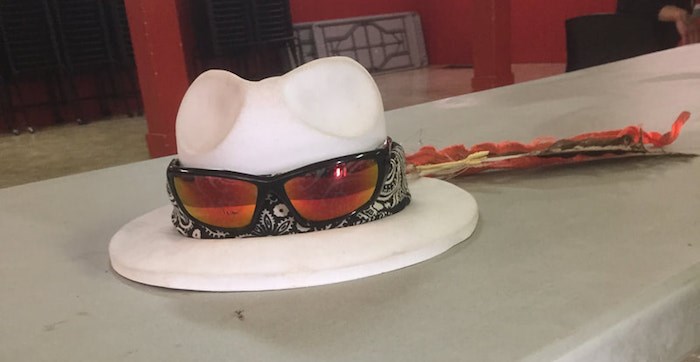The Vancouver Care Project is the work of 17-year-old Rachel Way, who engages with some of Vancouver’s most vulnerable residents facing poverty and homelessness. Each week she shares the story of one person she has met.
The purpose of this project is to share the stories of the lives of those living and working in and around Vancouver’s Downtown Eastside, as well as the homeless and marginalized population of Metro Vancouver. By creating a virtual story book, the goal is to end the stigma that surrounds the area and raise awareness to the struggles the people of the area face.
Child Number 46: Stripped of everything, including his identity, at 6 years old
 Child Number 46 (Photo by Rachel Way)
Child Number 46 (Photo by Rachel Way)
"What should I put your name as?" I asked the man with the big hair, my new friend from the Holy Trinity Soup Kitchen. "Put it as what they called me at the Residential School: Child Number 46".
Child Number 46. Second generation Residential School survivor.
My heart sank in my chest.
Before me sat a 62-year-old man who still lived with the trauma inflicted on him from when he was just six years old. "I was born in Bella Bella," shared Child Number 46. "I grew up with parents who had both attended Residential Schools and you can guess how that was." When he was just six years old he was stripped from his family, community, language and everything he had ever known and was forced into Saint Michael's Residential School in Alert Bay, 600 miles from his home.
As I spoke with Child Number 46, he reflected back on stories of abuse, neglect and sexual assault. "I got beaten for just about everything" he shared. Forced into a mentality where he had to be white and anything besides that--especially being himself--was subject to brutal punishment. "I was forced to understand how to be residential, how to be proper and not the 'savage' they thought I was."
When he left the Residential School the battle only continued: "I've lost so much of my language, so much of who I am." Life after Saint Michael's was a different, new sort of struggle: "I got beaten and threatened even post residential school."
His life turned to one of drinking and gambling to pass time and ease the pain. "The bashing I go through in my mind," he explained, "I used to think I can't be red, I can't be anything but white. It took me years to realize that I'm not six anymore."
I was inspired to meet this hurting man who lived a life of so much abuse, yet he was still left unbroken. His smile and jokes lit up the room, and I for one know I am one of the lucky people to have met him in my lifetime. Child Number 46's perseverance and attitude was remarkable.
"I can't trust anyone, I can't trust myself," he shared as he reflected on his daily mental health and identity struggles he faces. "But life goes on and I've got to make the most of it."
Every Thursday, when I go to the Soup Kitchen, I am always greeted with a warm smile and cheery hello from my friend, as we update one another on our weeks. You can always find him sitting with a crowd around him, people coming up to see him as he sits with that big, goofy smile of his sharing his latest adventure, usually with a big piece of pie. He really is one of the kindest, most genuine people I have met.
It breaks my heart to hear the stories he shares of people opting to stand over taking the last seat on the bus beside him or the daily judgement he faces, always in some new form. I hope that sharing his story can help us all to remember to catch ourselves when we want to judge based on our preconceptions and remember that some of the kindest, most genuine people are the people you would least expect. A perfect example of this is Child Number 46.
I am so grateful to Child Number 46 for sharing his stories of his life during and post Residential School. It is so important that we acknowledge the wrong-doings of the past and make ourselves aware of the trauma that was experienced by people and the inter-generational aftermath it created. It is crucial that we talk about the past and work together to create a better future for everyone living in Canada. On the day Canada remembers the legacy of the Residential Schools, the day of Reconciliation, whatever day it might be, I hope all Canadians can come together to heal, understand, build trust and work together to move forward. I thank Child Number 46 for sharing his story with us all so that we all can have a better understanding of the world we live in and look at something from a way we didn't see it before.
This post originally appeared on The Vancouver Care Project and is edited republished here with permission from the author.


